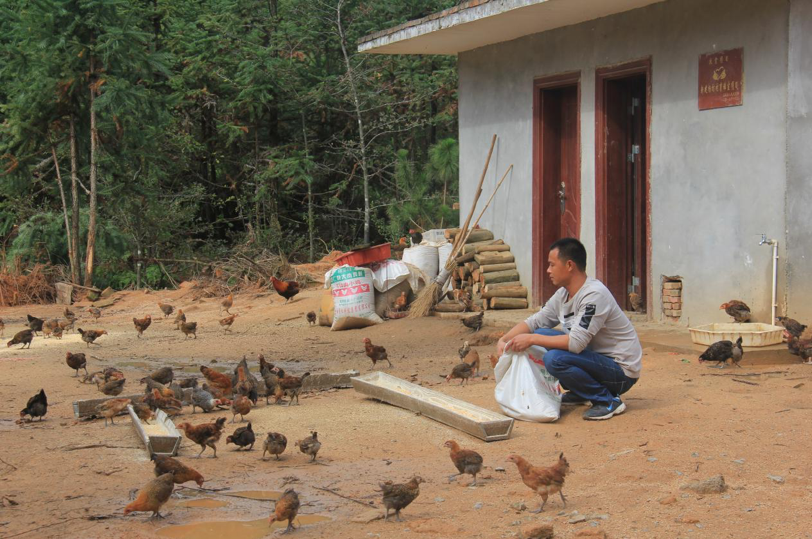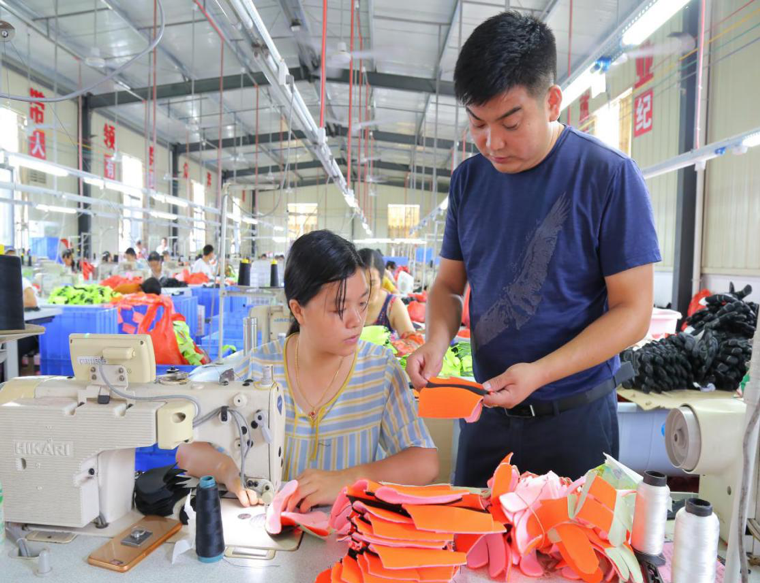Impoverished people in Shicheng County, Jiangxi Province have greatly improved their abilities to provide for themselves with the help of poverty alleviation entrepreneurs and have become motivated about their self-development, creating a good foundation for a sustainable future.
Measures
The villages of Shicheng County, Jiangxi Province had long suffered from under-development and poverty. With difficulty implementing poverty reduction projects, the sparsely populated rural area struggled to overcome low incomes and poor living conditions. However, the livelihoods of Shicheng locals have since been transformed thanks to a local poverty alleviation programme which has helped to vitalise the villages by training and cultivating entrepreneurs and their businesses. The programme has provided local business people with training courses, which offer business guidance, deliver key information sharing opportunities and help the entrepreneurs develop skills in assisting locals with escaping poverty. The programme has also been composed of various platforms established by village-level government bodies, including an entrepreneurial training platform and a platform for developing industry. The government bodies have also issued preferential policies that support the development of industry. The goal of all these efforts was to establish 'poverty alleviation businesses' that enable every household to access stable sources of income. Since implementation of the programme, locals have been able to lift themselves out of poverty, become more self-sufficient and developed a new sense of motivation to enhance their self-development. Ultimately, the programme has created a good foundation for a sustainable future for local villagers.
1. Shicheng programme trains 'poverty alleviation entrepreneurs'
The process for training the entrepreneurs starts with submission of application forms to village offices, who are then responsible for longlisting eligible candidates and referring them to township offices. The township offices are responsible for shortlisting candidates, and then the county office makes final selections based on the willingness of applicants to help lift locals out of poverty. It is not uncommon for village officials to apply to become "poverty alleviation entrepreneurs" and have become an important part of the programme. In fact, 203 village officials and 154 people eligible to become village officials had been selected as poverty alleviation entrepreneurs by the end of 2018.
The next step in programme implementation is for Shicheng government bodies to send a total of 160 poverty alleviation entrepreneurs on one-month training courses to the Poverty Alleviation Entrepreneurship Training Centre in Fujian Province, which assigns mentors to the participants so they can continue developing their skills for another 11 months post-training. This will help to create a sustainable poverty reduction model, as every entrepreneur attending the training will help to train six more entrepreneurs. Eventually, Shicheng will have an approximate total of 1,000 trained poverty alleviation entrepreneurs.
2. Poverty alleviation entrepreneurs help impoverished locals lift themselves out of poverty
Every poverty alleviation entrepreneur signs a contract that outlines their objectives and responsibilities and agrees to help at least five impoverished households increase their incomes for a total of one year. The entrepreneurs generally agree to follow the following four key methods where appropriate: (1) Rent land from impoverished households and employ people from those households; (2) Help impoverished people, who are able to work but lack skills and funds, to develop characteristic businesses with group guarantee loans; (3) Cooperate with Shicheng government bodies to establish county-level service centres and warehousing and distribution centres; and (4) Establish companies and cooperatives and make purchase orders of impoverished households' products at higher-than-market prices.

A Shicheng local living in poverty feeds his free-range chickens.
3.The Shicheng government implements various policies to help eliminate local poverty.
To accelerate local poverty reduction efforts, the county government launched several financial products, including industry development poverty alleviation loans and agricultural loans, which continue to be issued as part of the wider programme. The government also established a risk mitigation fund and developed unsecured loans with subsidized interest, which continue to be issued to eligible locals. Shicheng officials are also working to implement tax policies. They provide a subsidy of US$72,700 (RMB500,000) for every standardised village poverty alleviation workshop that is established by the entrepreneurs and also exempt rent and taxes for villagers for three years.
4. Shicheng creates platforms for poverty alleviation entrepreneurs so they can help lift locals out of poverty, and the entrepreneurs then establish poverty alleviation businesses.
Business creation is an important force in the fight against poverty. The entrepreneurs deliver many poverty alleviation workshops in villages that employ impoverished people, especially women and people with disabilities or illnesses. To support these efforts, the Shicheng government has integrated a variety of funds and resources into the programme, creating a poverty alleviation entrepreneurship fund, establishing an industrial development park, and implementing other measures to support the creation of businesses.

Shicheng business mentor Chen Congping teaches a local some sewing techniques during a poverty alleviation workshop.
5. Shicheng has driven business incubation to broaden entrepreneurial paths
The county has established the Farmers' E-commerce Innovation Park, worked with e-commerce companies, and created four county-level operation centres and 90 village-level service stations. Shicheng has also encouraged poverty alleviation entrepreneurs to establish online businesses in e-commerce incubation parks, and helped them broaden their ideas and entrepreneurial paths, in turn serving to eradicate local poverty.
Outcomes
1. Shicheng residents now have the capacity to continue driving business innovation development and entrepreneurs have greater capacity to help impoverished people. By encouraging impoverished people to enter business sectors that are in high demand and are easy to participate in, entrepreneurs have helped these locals provide for themselves and helped them understand their rights and obligations. As of June 2019, businesses created by poverty alleviation entrepreneurs had employed more than 4,200 impoverished people, and 203 impoverished households had created their own businesses.
2. Shicheng has succeeded in pursuing a market-oriented poverty alleviation path and can now eliminate poverty through business creation and innovation. By encouraging poverty alleviation entrepreneurs to participate in various characteristic industry clusters, Shicheng has succeeded in strengthening and expanding the poverty alleviation chain and highlighted the efficiency of characteristic businesses and their crucial role in eliminating poverty.
3. In addition, systematic training has helped to greatly improve the skills of poverty alleviation entrepreneurs and grassroots local farmer cooperatives. Village officials, business mentors and the entrepreneurs have become an important force in China's poverty alleviation fight and, to this day, they continue to learn from and cooperate with each other. Poverty alleviation entrepreneurs and village officials are new forces of social change in rural Shicheng and will play an increasingly important role in vitalising those areas.

Entrepreneur Huang Xiaoyong teaches locals various techniques at the Qilinshan Modern Agriculture Sightseeing Garden.
Lessons learned
1. Effective cooperation between poverty alleviation entrepreneurs and village officials is a key component of the national poverty elimination campaign: Village officials are the core leaders in rural areas. Therefore, it was crucial for the poverty alleviation entrepreneurs to cooperate with village-level government to gain insight into how to effectively encourage business development and spearhead local business entities. Collaboration is a key determinant for fighting poverty, which is why it was crucial that equal effort was put into training both the entrepreneurs and officials, and helping them coordinate. Through these efforts, the county has thus laid a solid foundation for the creation of a prosperous society.
2. Industry development is the fundamental solution to challenges surrounding poverty elimination: The Shicheng case study demonstrates that rural areas focused on business development, particularly in the areas of farming and animal husbandry, can encourage local talent to return home and support vital poverty reduction efforts. Entrepreneur-driven development of forestry, agricultural and breeding businesses have proven to be an effective poverty reduction method, especially when such development requires little input and technology. Training entrepreneurs has also proven to be an effective career development tool, and mobilising these skilled entrepreneurs to support impoverished villages has also proven to be key in helping locals drive up their incomes.
References: http://south.iprcc.org.cn/#/casestudies/caseDetails?id=256
Category
Poverty Alleviation Entrepreneurs Help Impoverished Locals Lift Themselves out of Poverty
Contributor
Poverty Alleviation Entrepreneurs Help Impoverished Locals Lift Themselves out of Poverty
Country
Case Study

